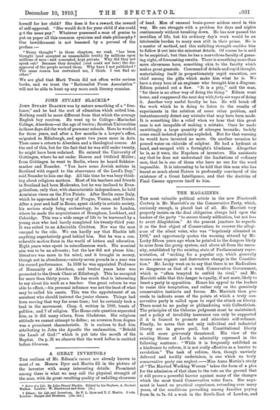A GREAT INVENTOR.t THE outlines of Mr. Edison's career are
already known to most of us. Messrs. Dyer and Martin fill in the picture of the inventor with many interesting details. Prominent among these is what we may call the physical strength of the man, with its great resulting quality of unfailing clearness
• Notes of a Life. By John Stuart Mackie. Edited by his Nephew, A. Stodart Walker. London : W. Blackwood and Sons. [63.] t Edison : his Life and Inventions. By F. L. Dyer and T. C. Martin. 2 vols. London Harper and Brothers. [163, net.] of head. Men of unusual brain-power seldom excel in this way. He can struggle with a problem for days and nights continuously without breaking down. He has now passed the meridian of life, but his ordinary day's work would be an intolerable burden to many men still in their prime. He is a master of method, and this unfailing strength enables him to follow it out into the minutest details. Of course he is said to be empirical; but then he has a marvellous faculty of guess- ing right, of forecasting results. There is something more than mere cleverness here, something akin to the faculty which makes great generals. Command a details and rapid thought, materialising itself in proportionately rapid execution, are chief among the gifts which make him what he is. We have a story here of an engineer who brought him a diagram. Edison pointed out a flaw. "It is a pity," said the man, "for there is no other way of doing the thing." Edison went home, and reappeared the next day with forty-six ways of doing it. Another very useful faculty he has. He will break off the work which he is doing to listen to the results of experiments in the solution of some other problem, and instantaneously detect any mistake that may have been made. It is something like a relief when we hear that this great man is not incapable of making a mistake. Once he made unwittingly a large quantity of nitrogen bromide; luckily some small isolated particles exploded. But for that warning he would have invented no more. On another occasion he poured water on chloride of sulphur. He had a hydrant at hand, and escaped with a fortnight's blindness. Altogether he is, as it were, the Napoleon of inventors. His assistants say that be does not understand the limitations of ordinary men, that he is one of those who have no use for the word impossible. It is interesting to be told that this man who has learnt so much about Nature is profoundly convinced of the existence of a Great Intelligence, and that the doctrine of Final Causes approves itself to him.


























































 Previous page
Previous page